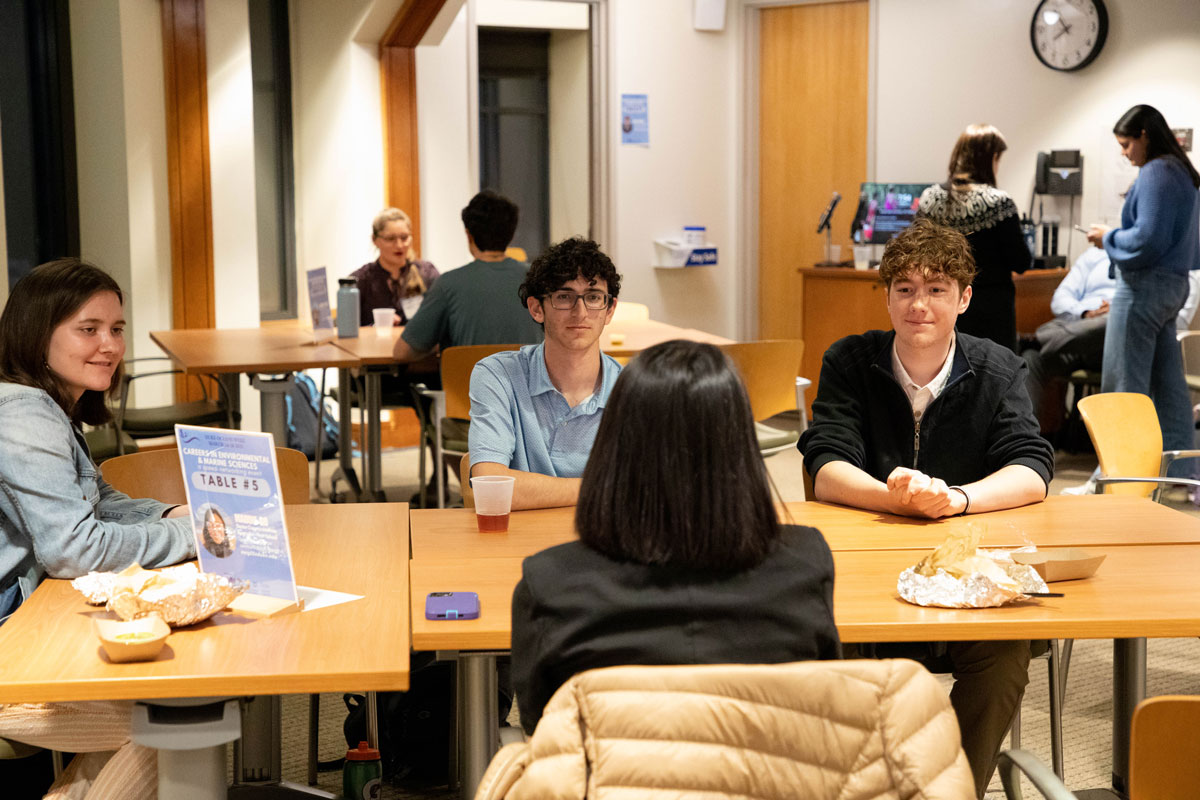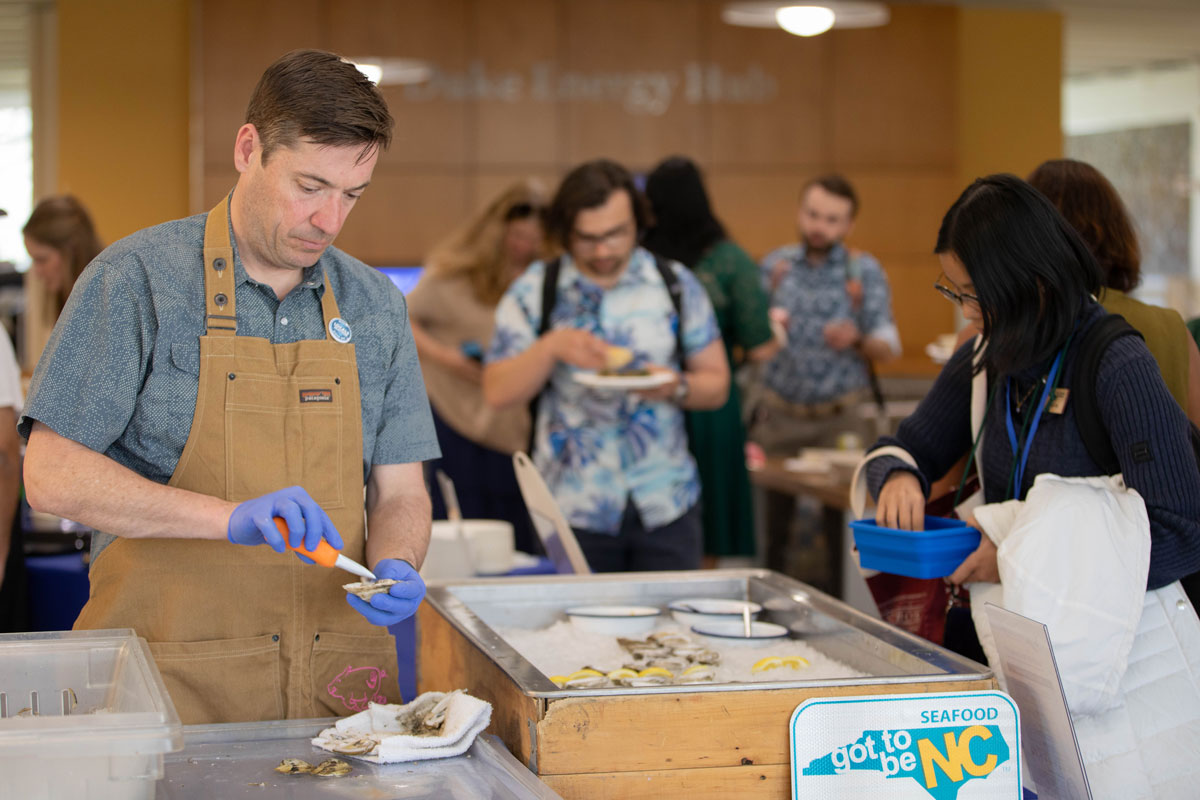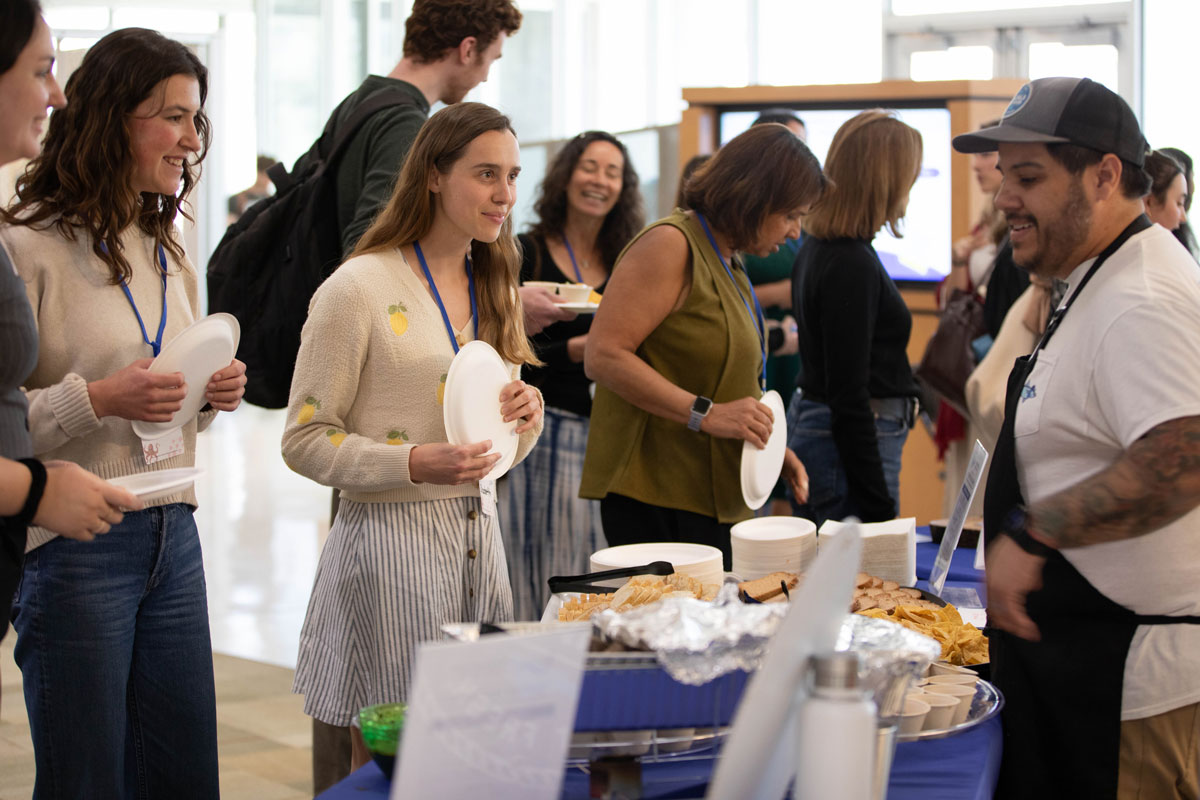Story by Kirsten Khire and photos by Matthew Bryant, Melissa Fernandez, and Lauren Ramsdell
Oceans Week at Duke University, held March 24-28, celebrated Duke’s leadership in ocean sustainability and explored how institutions like Duke can source local, regional and sustainable seafood to reduce carbon footprints and support coastal communities.
“Oceans Week was an exciting step in bringing together the many ocean-focused efforts happening across Duke—from ocean policy and marine research to sustainable seafood and coastal resilience. It created space for students, faculty, alumni and external partners to come together around innovative ideas for addressing our most pressing ocean challenges,” said Stephanie J. Rousso, managing director of Oceans at Duke, who co-led key events during Oceans Week with Carl Thompson, senior career specialist at the Nicholas Institute for Energy, Environment & Sustainability and the Duke Career Center.
Throughout the week, the discussions delved into topics that affect our environment, people, policies and economy—key impacts for climate and oceans, a focus area of the Duke Climate Commitment. Events explored the role of AI in marine science, plastic pollution in oceans, marine megafauna conservation, ocean-related careers and more.

Duke sophomore Anna Ochs, who is majoring in biology and in marine science and conservation, helped plan the events as a leader within the Duke chapter of the Sustainable Ocean Alliance. “We're trying to bridge the gap between the Duke community and the Marine Lab community, making sure our undergrads have access to current graduate students to really understand what life is like after graduation from Duke and all the different pathways and options they have," Ochs explained.
"I think this is a great way to learn about the opportunities available for students,” said environmental science major Annie Cushman. “I'm really interested in conservation, and I'm trying to figure out a way to go down that path by combining the science and the community and policy aspects. There are a few speakers that are at this event today that have been involved in various aspects of that conservation journey, so hearing what they've done and their advice on who to talk to, how to put your foot in the door, and what a career in conservation would look like—I think all of this can only help."
Highlights from “Ocean to Table: Climate-Resilient Innovations for Sustainable Blue Foods”
Oceans Week culminated in a daylong Ocean Sustainability Summit focused on how institutions can advance local, regional and sustainable seafood sourcing to reduce carbon footprints and support coastal community resilience in a changing climate.
Moderator Jennifer Bushman, founder and executive director of Fed by Blue, provided valuable context for the summit. Bushman also hosted a screening of PBS docuseries Hope in the Water as part of Oceans Week.
Bushman said, “When was the last time you sat down and asked whether the hamburger is wild or farmed?”
According to the United Nations, more than 3 billion people rely on the ocean for their livelihoods. Marine fisheries alone provide 57 million jobs globally and provide the primary source of protein to over 50% of the population in the least developed countries.
The summit began with an Innovation Showcase of research, startups and organizations advancing ocean sustainability, including a poster presentation featuring research by a Bass Connections team, represented by Nicholas School of the Environment faculty member Juliet Wong and undergraduate senior Sara Norton.
Norton helped with the field work that looked at increased death rates in oysters along the coast of NC that are impacting aquaculture farmers. The deaths have increased during the summers over the past decade, and some oyster farmers are seeing up to 90% mortality in the oysters at their farm. The research team found visible differences between oysters at two sites, and this summer the team will continue the research, looking at the impacts of wave energy and mechanical stress on the oysters – with the goal to help oyster farmers.


After the showcase, industry leaders explored sustainable seafood sourcing, supply chain transparency and the role of institutions in driving change. Speakers discussed the meaning of local plus sustainable for climate-friendly seafood supply chains.
Dan Vermeer, a professor at the Fuqua School of Business, highlighted Duke University's efforts in oceans research and convening over the past five years – starting with a faculty network, a webinar series and a student organization – that has led to Oceans Week.
“Our oceans are under great and increasing stress, while communities are challenged to protect resources and make viable livelihoods. Meanwhile, ocean environments are feeling the impacts of climate change. Duke has world-class science, policy expertise, interdisciplinary connections all over campus. Oceans require an interdisciplinary approach – in science, law, business and policy. Universities can contribute in an important way,” Vermeer said. “At Duke, we are connecting the dots to help.”

Lin Peterson, co-founder of Locals Seafood, talked about the impact of standards that can impact whether a fish is considered sustainable, even if it is the same species. “We are working with consumers to understand the catch methods.”
Kiley Dancy M.E.M.'12, a Duke alumna and fishery management specialist at the Mid-Atlantic Fishery Management Council, said all management councils operate under the Magnuson–Stevens Fishery Conservation and Management Act (2007), the primary law that governs marine fisheries management in U.S. federal waters. But the strong standards can alienate small-scale fisheries, which might not be able to afford certification, she said.
Adriana Sánchez, founder of Seafood Ninja, Inc., emphasized: “There are opportunities to introduce lesser-known species – and not everything local is sustainable. There has been miscommunication on what is sustainable.” Sánchez pointed out that some national hotel chains source sustainable seafood that is not local.
Duke alumna Sara McDonald Ph.D.'14, B.S.'90, director of conservation at the South Carolina Aquarium, said: “If you are buying local, you know who caught your seafood. You are also keeping your money local. You are supporting the local restaurant. You are reducing the carbon footprint.”
At the South Carolina Aquarium, McDonald is infusing local seafood into the community. The aquarium purchases seafood from a local fishhouse to help feed a local homeless shelter and provide food to a local culinary school and a local food bank.
“Each month we are feeding between 500 and 550 food-insecure neighbors,” she said.
McDonald and other panelists emphasized the need for consumers to know where their seafood comes from and the sustainability practices for a more balanced picture of climate-friendly food.
Peterson said, “Ask where your food comes from. Ask about every step of the process. And step out of your comfort zone to try a lesser-known species.”
Dancy said climate change is adding complexity to the seafood sustainability challenge. “Conditions are constantly changing. Vessels are having to go further to catch fish, which increases the carbon footprint,” Dancy said.

In a capstone address, Monica Jain, founder of Fish 2.0 and Manta Consulting, Inc., synthesized insights and outlined pathways for institutional change and innovation. Jain launched Fish 2.0 in 2013 to build a global network of entrepreneurs and investors driving sustainable seafood growth, working with over 400 entrepreneurs, 300 investors and 40 sponsors.
She challenged the students in the audience to innovate. “The real gift of the real innovator – it’s being a part of change. Not being on the sidelines, but being in the game,” she said. “MSE (marine stewardship) started in 1996 – that was almost 30 years ago. So many things have changed since then – but why has certification not changed? It has not innovated. The average amount of yield on fish is about 40% waste. But in Iceland, they are going to 100 percent utilization of fish. Several great industries have grown as a result. What if sustainable seafood was more here what changes would that create? All of the conditions for change are here at Duke.”


At the end of the summit, a chef-prepared tasting by Locals Seafood featured five creative recipes with underutilized species or parts of the fish. The offerings—all locally sourced, fully traceable back to the ocean from North Carolina’s coast—included ceviche from striped bass, trim oysters, shrimp salad, fresh fish dip and tuna meatballs.
“One of my favorite moments at the Ocean Sustainability Summit was the Taste of Traceability session led by Lin Peterson from Locals Seafood. His demonstration of shucking oysters, coupled with discussions about the origins and cultivation of the seafood, truly brought the concept of traceability to life in a tangible and memorable way,” said Brooke Lynn Elzweig, a master of environmental management student who is co-president of the Oceans@Duke graduate student club.
Partners for Oceans Week included the Nicholas Institute for Energy, Environment & Sustainability; Fuqua School of Business; Nicholas School of the Environment; Duke University Marine Lab; Duke Career Center; Ocean Policy Working Group; Working Group for the Environment in Latin America; and the Duke University chapter of the Sustainable Ocean Alliance.
Oceans Week aimed at raising awareness about ocean conservation, marine science and the role of oceans in climate sustainability. The events brought together students, faculty, industry professionals, alumni and environmental advocates to engage in discussions, panels, workshops and networking opportunities focused on marine research, policy and career pathways.
“This year, Oceans Week helped us collate a variety of events under one shared platform. The conversations were rich, and the enthusiasm was clear,” Rousso said. “Looking ahead, we hope to make it even more cohesive and strategic—attracting decision makers from across the U.S. and globally. Next year, we envision each day focusing on a different ocean theme while maintaining a connective thread that highlights the interdisciplinary and international nature of ocean solutions.”
Special thanks to master of environmental management student Shen Shen and the entire team of student volunteers, as well as to Jennifer Edwards, Katie Cloud, and the communications team at the Nicholas Institute.
Be Part of the Conversation
- Learn more about the summit.
- Join the Oceans at Duke email list.
- Questions? Reach out to dukeoceans@duke.edu.



